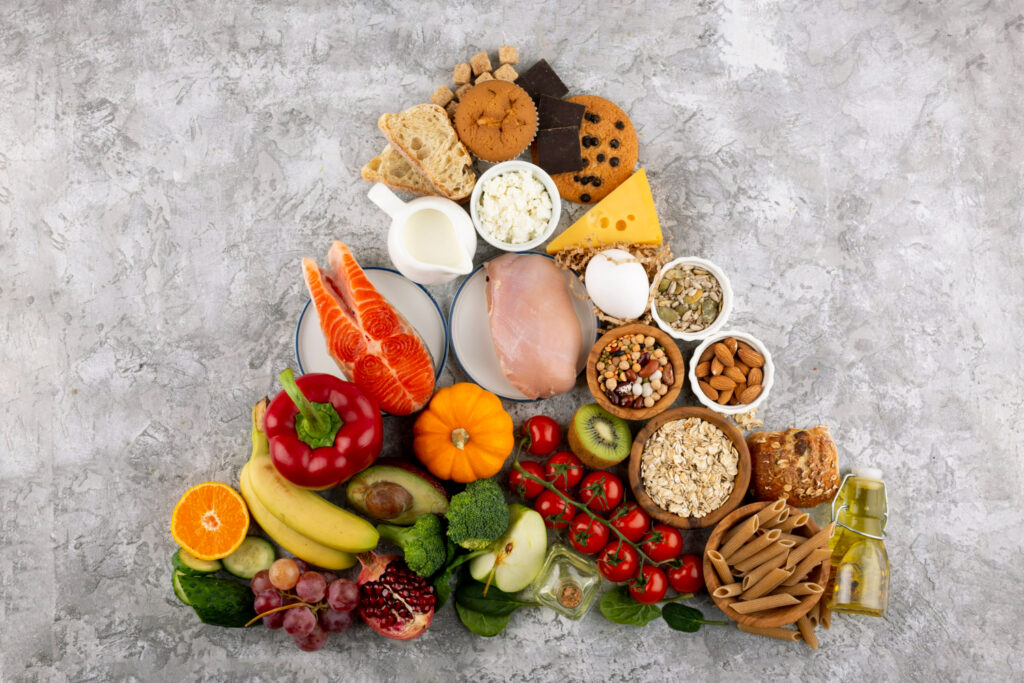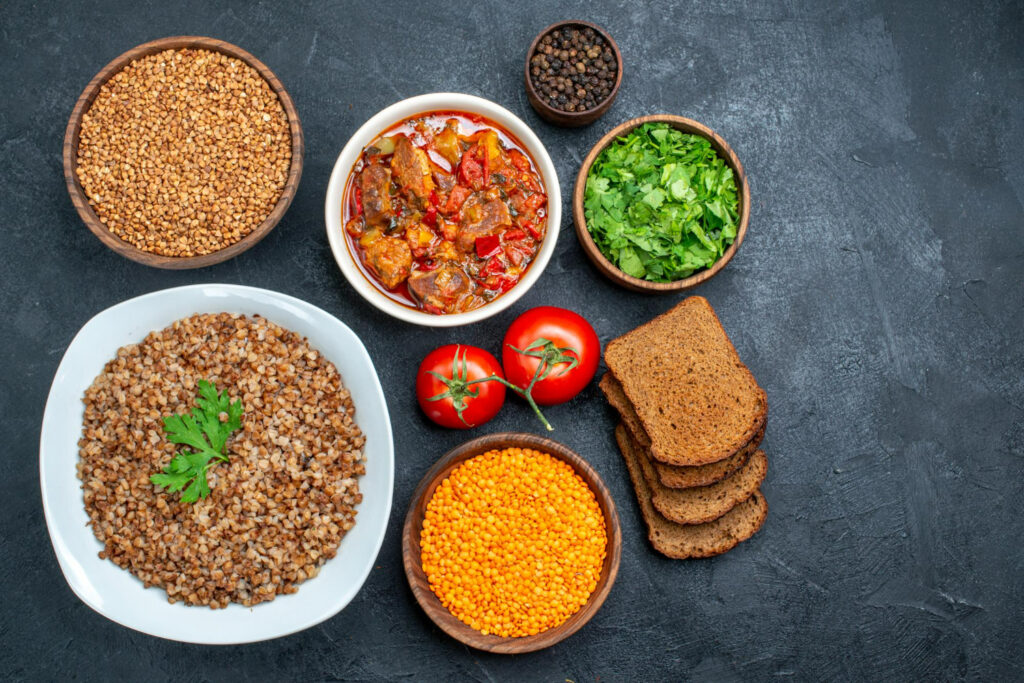Achieving and maintaining healthy weight loss routine can be challenging in today’s fast-paced world. With so many diets, fitness plans, and wellness trends, it’s easy to feel overwhelmed. However, effective weight loss doesn’t have to be complicated. By focusing on sustainable habits, you can reach your goals without sacrificing your well-being. Here are the top 10 tips for effective weight loss that can help you succeed:
1. Set Realistic Goals

Setting achievable and realistic weight loss goals is crucial. Instead of aiming for rapid weight loss, focus on gradual and steady progress. Aim for losing 1-2 pounds per week, which is considered safe and sustainable by health experts. This approach helps you develop long-term habits that support weight maintenance.
Setting realistic and achievable goals is one of the foundational steps in any weight loss journey. Unrealistic expectations can lead to frustration, burnout, and ultimately, giving up. Here’s how to set realistic goals effectively:
- Focus on Progress, Not Perfection: Understand that weight loss is not a linear process. There will be ups and downs, so it’s essential to stay positive and celebrate progress, no matter how small.
- Break Down Larger Goals into Smaller Milestones: Instead of setting a goal to lose 50 pounds, start with aiming to lose the first 5-10 pounds. Smaller, more manageable goals make it easier to track your progress and build confidence.
- Set SMART Goals:
- Specific: Define your goal clearly. For example, “I want to lose 10 pounds” is more specific than “I want to lose weight.”
- Measurable: Make sure your progress can be tracked. Weigh-ins, measurements, or progress photos can help you see how far you’ve come.
- Achievable: Ensure the goal is realistic given your current lifestyle and circumstances. Aiming to lose 1-2 pounds per week is considered safe and sustainable.
- Relevant: Your goal should align with your overall health and wellness objectives.
- Time-bound: Set a timeframe for your goal, such as “I want to lose 10 pounds in three months.”
- Prioritize Sustainable Habits Over Quick Fixes: Crash diets and extreme restrictions may lead to rapid weight loss initially, but they are difficult to maintain and can result in weight regain. Opt for approaches that you can stick with long-term, like balanced meals and regular exercise.
- Adjust Goals as Needed: As you progress, you may need to modify your goals based on your results. Flexibility allows you to stay motivated and focused without feeling pressured by unrealistic expectations.
By setting realistic, achievable goals, you create a roadmap that not only guides you through your weight loss journey but also promotes long-term success and a healthier lifestyle.
2. Prioritize Whole, Nutrient-Dense Foods

Your diet should include plenty of whole foods that are rich in nutrients, such as fruits, vegetables, lean proteins, whole grains, and healthy fats. These foods provide essential vitamins and minerals and help you feel fuller for longer, which can prevent overeating. Avoid highly processed foods that are often high in sugar, unhealthy fats, and empty calories.
Choosing whole, nutrient-dense foods is essential for effective weight loss and overall health. These foods provide your body with the vitamins, minerals, and other nutrients it needs to function optimally, helping you feel full, energized, and satisfied. Here’s why and how to make whole foods a priority in your diet:
- Nutrient Density Explained: Nutrient-dense foods are those that are rich in vitamins, minerals, fiber, and other essential nutrients compared to their calorie content. Examples include fruits, vegetables, lean proteins, whole grains, nuts, and seeds. Unlike processed foods, which often contain empty calories from added sugars and unhealthy fats, nutrient-dense options support your body’s functions without unnecessary additives.
- Benefits of Whole Foods for Weight Loss:
- Increased Satiety: Foods high in fiber, such as leafy greens, legumes, and whole grains, help you feel full longer. This reduces the temptation to snack on unhealthy options and supports portion control.
- Stable Energy Levels: Nutrient-dense foods provide a steady source of energy without the sudden blood sugar spikes and crashes that refined carbohydrates can cause.
- Reduced Cravings: A balanced diet that includes whole foods can naturally reduce cravings for processed and sugary snacks by keeping nutrient deficiencies at bay.
- Tips for Incorporating More Whole Foods:
- Fill Half Your Plate with Vegetables: Make vegetables the star of your meals by filling half your plate with a variety of colorful options. This ensures you’re getting plenty of vitamins, minerals, and antioxidants.
- Choose Whole Grains Over Refined Carbs: Replace refined grains like white bread and white rice with whole grains such as quinoa, brown rice, and whole wheat bread. Whole grains contain more fiber and nutrients, promoting better digestion and fullness.
- Opt for Lean Proteins: Include sources of lean protein such as chicken, turkey, fish, tofu, and legumes in your diet. Protein helps repair tissues and maintain muscle mass, which is important for metabolism.
- Snack Smartly: Replace processed snacks with options like fresh fruit, a handful of almonds, or Greek yogurt. These provide a mix of healthy fats, protein, and fiber to keep you satiated.
- Plan Balanced Meals: Each meal should contain a balance of lean protein, healthy fats, and complex carbohydrates. This combination helps keep your energy levels stable and supports overall nutritional needs.
- Stay Hydrated with Nutritious Beverages: While water is the best option, consider adding nutrient-dense beverages like herbal teas or smoothies made from whole fruits and vegetables without added sugars. These can be refreshing and nourishing additions to your diet.
- By prioritizing whole, nutrient-dense foods, you not only support weight loss but also enhance your overall health. This approach ensures your body receives the necessary fuel to thrive while making your weight loss journey more sustainable and enjoyable.
- Avoid Ultra-Processed Foods: Ultra-processed foods are often loaded with added sugars, unhealthy fats, and artificial additives, which can lead to weight gain and other health issues. Try to limit consumption of items like sugary cereals, packaged snacks, fast food, and sweetened beverages. Focus on preparing meals with simple, whole ingredients that you can pronounce and recognize.
3. Stay Hydrated

Drinking enough water is essential for overall health and can aid in weight loss. Sometimes, thirst is mistaken for hunger, leading to unnecessary snacking. Aim to drink at least 8 glasses (64 ounces) of water a day. Staying hydrated helps boost metabolism, supports digestion, and improves energy levels.
4. Incorporate Regular Physical Activity
Exercise is a key component of any weight loss plan. Aim for at least 150 minutes of moderate aerobic activity or 75 minutes of vigorous activity per week, as recommended by the CDC. Include strength training exercises at least twice a week to build muscle, which can help boost metabolism. Find activities you enjoy, whether it’s dancing, swimming, cycling, or hiking, to make it easier to stick to your fitness routine.
5. Get Enough Sleep
Lack of sleep can negatively impact your weight loss efforts. Poor sleep can lead to increased hunger and cravings, particularly for high-calorie, sugary foods. Aim for 7-9 hours of quality sleep per night. Prioritizing good sleep hygiene, such as maintaining a consistent sleep schedule and minimizing screen time before bed, can make a significant difference.
Getting enough quality sleep is an often overlooked yet vital component of effective weight loss and overall health. Sleep impacts nearly every aspect of your well-being, from metabolism and energy levels to hunger regulation and mental clarity. Here’s why prioritizing sleep is essential for weight loss and tips on how to improve your sleep quality:
- The Connection Between Sleep and Weight Loss:
- Hormonal Balance: Sleep plays a crucial role in regulating the hormones that control hunger and appetite. When you don’t get enough sleep, levels of ghrelin (the hunger hormone) increase, while leptin (the hormone that signals fullness) decreases. This imbalance can lead to increased cravings and overeating.
- Metabolism and Energy: Lack of sleep can slow down your metabolism, making it more challenging for your body to burn calories efficiently. Poor sleep is also linked to reduced energy levels, which can decrease your motivation to exercise and stay active.
- Benefits of Adequate Sleep for Weight Loss:
- Improved Decision-Making: Sleep deprivation affects cognitive function, making it harder to make healthy food choices. When you’re well-rested, you’re more likely to opt for nutritious meals instead of reaching for high-calorie, quick fixes.
- Better Exercise Performance: Quality sleep enhances physical performance, allowing you to maximize the benefits of your workouts. This, in turn, supports muscle recovery and fat loss.
- Reduced Stress: Sleep helps regulate cortisol, the stress hormone. High cortisol levels can lead to weight gain, particularly around the midsection. By getting enough rest, you help manage stress and reduce the risk of emotional eating.
- Tips for Improving Sleep Quality:
- Maintain a Consistent Sleep Schedule: Go to bed and wake up at the same time every day, even on weekends. This helps regulate your body’s internal clock and can improve sleep quality.
- Create a Relaxing Bedtime Routine: Establish a calming pre-sleep routine that signals your body it’s time to wind down. This could include activities like reading, meditating, or taking a warm bath.
- Limit Screen Time Before Bed: The blue light emitted by smartphones, tablets, and computers can interfere with your body’s natural sleep-wake cycle by reducing melatonin production. Try to avoid screens at least an hour before bedtime.
- Optimize Your Sleep Environment: Make your bedroom conducive to sleep by keeping it cool, dark, and quiet. Use blackout curtains, earplugs, or a white noise machine if needed.
- Be Mindful of Caffeine and Alcohol: Consuming caffeine in the afternoon or evening can disrupt your sleep. Similarly, while alcohol might make you feel drowsy, it can interfere with deep sleep cycles, affecting overall sleep quality.
- Prioritize Sleep Hygiene:
- Comfortable Bedding: Invest in a good mattress and comfortable pillows that support your sleep posture. This can make a significant difference in your sleep quality.
- Regular Physical Activity: Engaging in regular exercise can help you fall asleep faster and enjoy deeper sleep. However, avoid vigorous exercise close to bedtime, as it can have a stimulating effect.
- Mindful Eating: Avoid large, heavy meals before bedtime. Eating a large meal late at night can cause discomfort and disrupt your sleep. If you need a snack before bed, choose light, sleep-promoting foods like bananas, almonds, or a warm glass of milk.
6. Practice Mindful Eating

Mindful eating involves paying attention to your food and the act of eating without distractions. This practice can help you recognize hunger and fullness cues, prevent overeating, and improve your relationship with food. Take time to savor each bite, chew thoroughly, and eat slowly to enjoy your meals more fully.
7. Keep Track of Your Progress
Tracking your progress can provide valuable insights into your weight loss journey. Use a journal, mobile app, or digital tracker to log your meals, exercise, and other habits. This helps you identify patterns, celebrate milestones, and make adjustments if needed. Be honest and consistent with your tracking to get the most accurate picture of your progress.
8. Manage Stress Levels
Chronic stress can lead to weight gain or hinder weight loss efforts by increasing levels of cortisol, a hormone that can promote fat storage, particularly around the abdominal area. Engage in stress-reducing activities such as meditation, yoga, deep breathing exercises, or spending time in nature. Prioritizing mental well-being is just as important as physical activity and diet.
9. Don’t Skip Meals
Skipping meals, especially breakfast, can backfire by causing overeating later in the day. Eating balanced meals throughout the day helps regulate blood sugar levels and keeps your metabolism active. Start your day with a nutritious breakfast that includes protein, healthy fats, and fiber to set a positive tone for the rest of your meals.
10. Stay Consistent and Patient
Consistency is key when it comes to weight loss. Results may not happen overnight, but staying committed to your healthy habits will lead to progress over time. Weight loss journeys often include plateaus, but these are a normal part of the process. Be patient with yourself, and avoid comparing your progress to others. Remember, long-term success comes from sustainable lifestyle changes, not quick fixes.
11. Embrace the Power of Meal Prep
Meal prepping can be a game-changer for staying on track with your weight loss goals. Preparing meals ahead of time ensures that you have healthy, portion-controlled options readily available, reducing the temptation to reach for convenience foods. Start by planning your meals for the week, shopping for necessary ingredients, and setting aside a few hours to prep and store your meals. This approach saves time, money, and helps you make healthier choices consistently.
12. Add More Fiber to Your Diet

High-fiber foods are great for weight loss because they help you feel fuller for longer, aiding in appetite control. Fiber-rich foods include fruits, vegetables, whole grains, legumes, and seeds. Studies have shown that increasing fiber intake can improve weight management and overall health. Aim for at least 25-30 grams of fiber per day.
13. Limit Added Sugars and Refined Carbs
Refined carbs and added sugars can lead to spikes and crashes in blood sugar levels, which may increase hunger and cravings. Instead of refined carbs like white bread and sugary snacks, choose complex carbohydrates such as brown rice, quinoa, and whole wheat products. Reducing added sugars, especially those found in sodas, pastries, and candies, can help lower calorie intake and improve metabolic health.
14. Stay Accountable with a Support System
Having a support system can make a significant difference in your weight loss journey. Share your goals with friends or family members, or consider joining a support group or community, either in person or online. Accountability partners can motivate you, offer advice, and celebrate achievements with you, making it easier to stay committed to your plans.
15. Reevaluate Your Relationship with Food
Developing a healthy relationship with food is essential for long-term weight loss. Avoid labeling foods as “good” or “bad” and instead focus on balance and moderation. Practice listening to your body’s hunger and fullness cues and recognize emotional eating patterns. Seeking guidance from a registered dietitian or nutritionist can help address any problematic behaviors and develop positive eating habits.
16. Use Visual Cues for Portion Control
Portion control is critical for managing calorie intake. One simple way to manage portions is by using smaller plates and bowls, which can create the illusion of a fuller plate and help you eat less. Visual cues, such as filling half your plate with vegetables, one-quarter with lean protein, and one-quarter with whole grains, can help you build balanced meals without the need for measuring.
17. Include High-Intensity Interval Training (HIIT)
In addition to regular aerobic and strength training exercises, incorporating high-intensity interval training (HIIT) can boost your weight loss efforts. HIIT involves short bursts of intense exercise followed by periods of rest or lower-intensity movement. This type of training is highly effective at burning calories and increasing metabolic rate even after the workout ends.
18. Plan for Occasional Treats
Restrictive diets can lead to feelings of deprivation and eventual overeating. Allowing yourself occasional treats in moderation can help you stay on track and avoid binge eating. Plan indulgences mindfully, so they become part of a balanced approach rather than an unplanned splurge.
19. Educate Yourself About Nutrition Labels
Understanding how to read nutrition labels can empower you to make informed food choices. Pay attention to serving sizes, calories, and the amounts of sugar, fat, and sodium in packaged foods. This knowledge can help you identify healthier options and avoid hidden sources of extra calories.
20. Celebrate Non-Scale Victories
Weight loss is not just about the number on the scale. Celebrate non-scale victories such as improved energy levels, better sleep, increased strength, or fitting into an old pair of jeans. Recognizing these achievements can keep you motivated and remind you of the overall benefits of a healthy lifestyle.
Conclusion
Effective weight loss is not just about following the latest trend; it’s about creating sustainable habits that support your overall health. By setting realistic goals, eating nutrient-dense foods, staying active, managing stress, and practicing mindfulness, you can achieve your weight loss objectives. Stay consistent, patient, and remember that each step forward is a victory on your journey to a healthier life.
FAQs
1. How much weight is safe to lose per week?
It’s generally considered safe and sustainable to lose 1-2 pounds per week. This rate helps ensure that you’re losing fat, not muscle, and allows your body to adjust to lifestyle changes more effectively.
2. Can I lose weight without exercising?
Yes, it is possible to lose weight through diet alone by creating a calorie deficit. However, incorporating exercise is highly beneficial as it boosts metabolism, preserves muscle mass, and supports overall health. Even light physical activity can contribute to long-term weight management.
3. How important is drinking water for weight loss?
Drinking water is essential for effective weight loss. Staying hydrated can help control hunger, boost metabolism, and improve digestion. Drinking water before meals can also aid in reducing calorie intake by promoting a sense of fullness.
4. What role does sleep play in weight loss?
Sleep is crucial for weight loss because it regulates hormones that control appetite. Lack of sleep increases levels of ghrelin (hunger hormone) and decreases leptin (satiety hormone), leading to increased cravings and potential overeating. Quality sleep also supports better decision-making and energy levels for exercise.
5. Are cheat days okay when trying to lose weight?
Occasional cheat meals can be part of a balanced approach to weight loss, helping you stay motivated and avoid feeling deprived. However, it’s important to practice moderation and not let one indulgent meal lead to overconsumption.




Göktürk su kaçak tespiti Ümraniye su kaçağı tespiti: Ümraniye’de su kaçaklarına son veren uzman ekip. https://oolibuzz.com/ustaelektrikci
Pingback: Social Media Challenges: 5 Ways They Promote Healthy Weight Loss or Encourage Harmful Practices -
Pingback: The Rise of GLP-1 Weight Loss Medications: What You Need to Know -